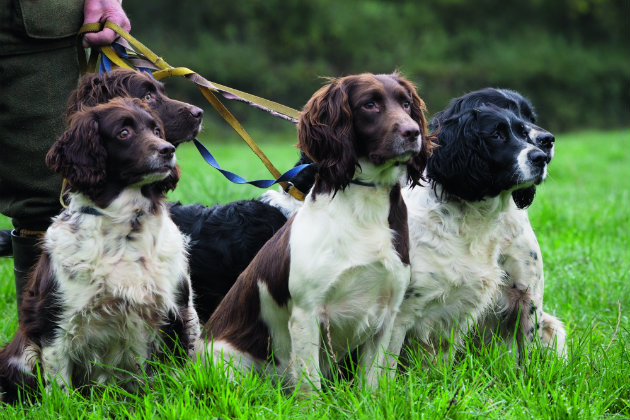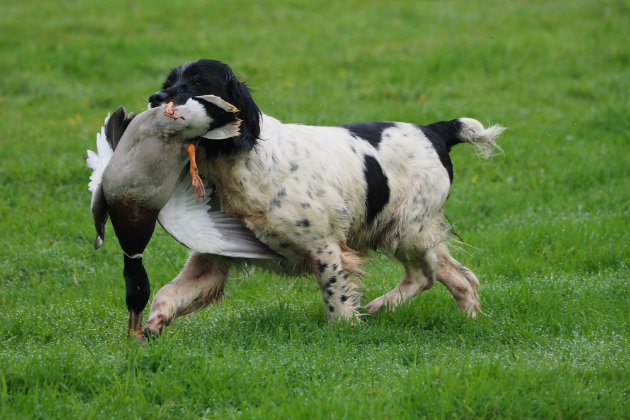What is a five generation pedigree certificate?
We have purchased a springer spaniel that is Kennel Club registered but the five generation pedigree certificate is confusing because…

We take neutering of dogs for granted. But should we?
Jackie Drakeford writes: “Many people who experience problems with their gundogs, especially male dogs, are assured that neutering will stop straying, running off and fighting. In truth, these issues are reliably fixed with a fence, a lead and proper training. During normal development, the mammalian brain receives a cocktail of hormones that rewire it during adolescence to form a well-adjusted adult.
“Pre-pubertal neutering results in a permanent puppy. While unneutered dogs sometimes suffer from separation anxiety or noise phobia, for instance, the prevalence of such behaviours in pre-pubertal neuters is significant. Interaction with other dogs can be tricky too, because what we have is puppy attitude in an adult body and most other dogs don’t like it one bit. Thus we sow the seeds of dog-on-dog aggression, because the early neuter just will not take “no” for an answer.
“Adolescence is the time when the majority of dogs are neutered and most dogs given up to rescue kennels are between six months and two years old. Owners get embarrassed about adolescent hypersexuality, which is often why people have a dog castrated, but neutered dogs will still hump because such behaviour is not just sexual and can be seen in either gender. Rhythmic repetitive actions release comforting endorphins so the massive loss in confidence from the hormone drop caused by neutering may increase the very behaviour it was supposed to solve.”

If a gundog is neutered as an adolescent, it may remain one
“Castrated dogs can still mate and tie, with a real risk of injury. Adolescent challenging of other dogs — “Who are you looking at?” — is naturally grown out of if those hormones are left to create adult brain development. However, if the dog is neutered in the middle of that phase, it is likely to remain a stroppy youth all its life. Far from preventing fighting, neutering may exacerbate it.
“In behaviour terms, dogs should not be neutered until adults to allow for proper mental development. Sensitive breeds or individuals can suffer a catastrophic loss of confidence from neutering, which can exacerbate aggressive behaviour because most aggression (not all) has its roots in fear. Calm, confident dogs with a mature attitude don’t find it necessary to threaten.”
Some circumstances make neutering sensible, such as if you have a mixed-gender group of dogs, or if you want to avoid your bitch missing most of a shooting season because she cycles at the wrong time. A few male dogs can be obsessed by sex, and occasionally bitches have troublesome seasons. Keeping dogs that are capable of breeding does involve more care and responsibility and may be impractical in households where not all members can be trusted to close doors and gates. If we wait until our dog is physically and mentally fully grown, then there is little to say against neutering, unless a dog is exceptionally under-confident.

Studies on several thousand golden retrievers showed that neutered animals were more likely to develop hypothyroidism (underactive thyroid)
My rethink on neutering dogs was prompted by vet Mark Elliott. I first came across Mark some years ago when I decided to switch my dogs on to a raw-food diet: he was one of the first veterinary surgeons in this country to promote the health benefits of feeding bones and raw food. It is Mark’s view that far too many dogs are neutered in this country, and that the main reason most are operated on isn’t for the individual animal’s health, but because it is convenient for the owner to have a dog that is incapable of breeding. He is particularly concerned about the trend for spaying bitches before they have had their first season and castrating males while still puppies.
Studies on several thousand golden retrievers showed that neutered animals were more likely to develop hypothyroidism (underactive thyroid), particularly those that were neutered when very young. Hypothyroidism can lead to numerous other problems, including lethargy, slow heart rate and skin infections, while there is evidence that dogs suffering from this condition are far harder to train.
Rupture of the canine cranial cruciate ligament (CCL) remains the most common orthopaedic problem seen in veterinary practice around the world. There is also increasing evidence that early neutering may affect the development (conformation) of the tibia and other long bones in a dog.
Here in the UK we have more neutered dogs than any other country in Europe — more than 80 per cent — yet in at least three European countries the practice is banned. According to Mark it can be argued that “it is arguably a mutilation with no clinical benefit to the patient. The main reason neutering is done is for the perceived benefit of the human population.” Really? I was under the impression, perhaps mistakenly, that there were health benefits. Mark says the perceived health benefits are negligible and there are many negative effects that outbalance the gains.

Bitches that have been spayed are more prone to weight gain than those left entire
There are, of course, apparent societal advantages, which is why so many of us opt to have our dogs neutered. These include stopping unwanted pregnancies, avoiding the inconvenience of your bitch coming into season, and making male dogs less prone to be aggressive or roam in search of bitches. Breeders use early neutering to prevent purchasers of their puppies exploiting their bloodlines. These may all be sound arguments but when you think about it, they are all for the benefit of us owners rather than the dogs themselves.
Mark has seen puppies as young as seven weeks being sent to their new homes already neutered. Some of these puppies, he says, are proving untrainable and aggressive, and have allergy and growth issues. He adds that this is particularly noticeable in “designer dogs”, such as labradoodles and cockerpoos, rather than gundogs, but in his opinion it is cruel to subject these dogs to a lifetime of problems.
Neutering can extend a dog’s life slightly but not significantly, but there is a moderate risk of increased obesity, hip dysplasia and cranial cruciate ligament disease. A spayed bitch is less likely to suffer from mammary tumours, and of course such problems as uterine, ovarian and vaginal tumours are ruled out. Similarly, a castrated dog can’t suffer from testicular tumours. However, neutering leads to a moderate increase in the dog suffering from a number of other serious complaints, ranging from cancers such as lymphoma to cystitis. Many bitches that have been spayed suffer from incontinence.
Neutering, like any serious operation, incurs a risk of death but it is thought to be only about one in 1,000. Not surprisingly, there are no mortality statistics for neutering puppies under eight weeks.
It’s a question that faces most of us who own or work bitches, and it’s one that I’ve changed my mind on in recent years. I have kept bitches exclusively for more than 30 years — I’ve got nothing against dogs, but in a two-spaniel household keeping a pair of the same sex has been the sensible option.
My first springer bitch was never bred from, never suffered from mammary tumours, and lived well past her 13th birthday. However, in her latter years she suffered from phantom pregnancies, which are not uncommon in un-neutered bitches. Nobody knows what causes the problem, but it’s thought to be a hormonal imbalance.
The symptoms become evident a couple of months after the bitch has been in season, with the animal displaying enlarged mammary glands, restlessness and even loss of appetite. Most get over it after a couple of weeks or so, but if it happens during the shooting season the bitch is unlikely to want to work,and in the worst cases veterinary treatment is essential.
Spayed bitches suffer a much greater likelihood of incontinence. This varies from breed to breed, with one study showing that 34 per cent of Irish setters suffered after being spayed, but only 6.8 per cent of springers, 3.2 per cent of Labradors and two per cent of cockers.
My next springer bitch was bred from and never suffered phantom pregnancies, but did develop cancerous mammary tumours in her later years and underwent a couple of operations to have these removed. This was following veterinary advice but, in hindsight, I’m not convinced that the operations were a good idea. I’ve known many older bitches that have developed mammary lumps or tumours, and the animals that have survived the longest seem to have been those that weren’t operated on. Of course, all cases are different, and it is best to follow veterinary advice, but this is a case where a second opinion is worth seeking. My bitch lived until she was 11, but life was becoming a struggle so I reluctantly had her put down.
Both benign and malignant tumours of the mammary glands are common in older bitches, especially unspayed animals over the age of 10, but they can appear at any age. Some breeds suffer more than others and, of the gundogs, English springers, cockers, pointers, English setters and Brittanys are all particularly vulnerable. The tumours appear in the form of a lump under the skin. If they can be moved freely then they are likely to be benign, but those that are fixed tend to be malignant or cancerous. They are usually slow- growing, particularly in older dogs and for this reason many vets are reluctant to remove them from old animals.
Even the experts aren’t sure what causes some dogs to develop lumps and others not, but it’s probably something to do with the genes. Curiously, one bitch from a litter may develop lumps, but her litter sisters may remain lump-free. It’s worth noting that males can also develop similar lumps, though this is much rarer. It is also bad news, as few recover.
We have purchased a springer spaniel that is Kennel Club registered but the five generation pedigree certificate is confusing because…
I am a diligent reader of dog stories, but one I missed earlier this year was a regional map of…
There’s only one sure way to prevent your bitch developing mammary tumours: have her spayed at around six months. Veterinary advice used to be to have a bitch spayed after her second season, but these days most vets suggest that it’s best to operate on young animals before their first season. I had my bitch Rowan spayed at the age of four when she developed a mammary tumour. The latter proved to be benign, but as I had no plans to breed from her it seemed sensible to have her spayed at the same time as the lump was removed. Four years on, there has been no recurrence.
The chief disadvantage of having a bitch spayed is that the animal is then more prone to put on weight. However, this is something you can control and is a small price to pay for the fact that you don’t have to worry about your dog coming into season at inconvenient times, or any problems with unwanted pregnancies. Neutered dogs are barred from entering dog shows, but they are welcome to enter field trials.
One of the most common assumptions that the paper disputes is that neutered dogs are better behaved. Intriguingly, the most commonly observed problem with spayed bitches is fearful behaviour, while for dogs it is aggression — the reason that many dogs are castrated in the first place.
What is worrying is that neutering has become accepted practice with most pet dogs. According to Mark: ‘Clinically the arguments for neutering do not stack up to much at all and it may be a negative action when looking at their long-term health. While for bitches there are some apparent health benefits, they are still minimal when compared with the long-term health issues should the individual be unfortunate enough to suffer them.’
Mark strongly believes that early neutering without explaining the potential risks is unethical, and I’m sure most of us agree.
Get the latest news delivered direct to your door
Discover the ultimate companion for field sports enthusiasts with Shooting Times & Country Magazine, the UK’s leading weekly publication that has been at the forefront of shooting culture since 1882. Subscribers gain access to expert tips, comprehensive gear reviews, seasonal advice and a vibrant community of like-minded shooters.
Save on shop price when you subscribe with weekly issues featuring in-depth articles on gundog training, exclusive member offers and access to the digital back issue library. A Shooting Times & Country subscription is more than a magazine, don’t just read about the countryside; immerse yourself in its most authoritative and engaging publication.

